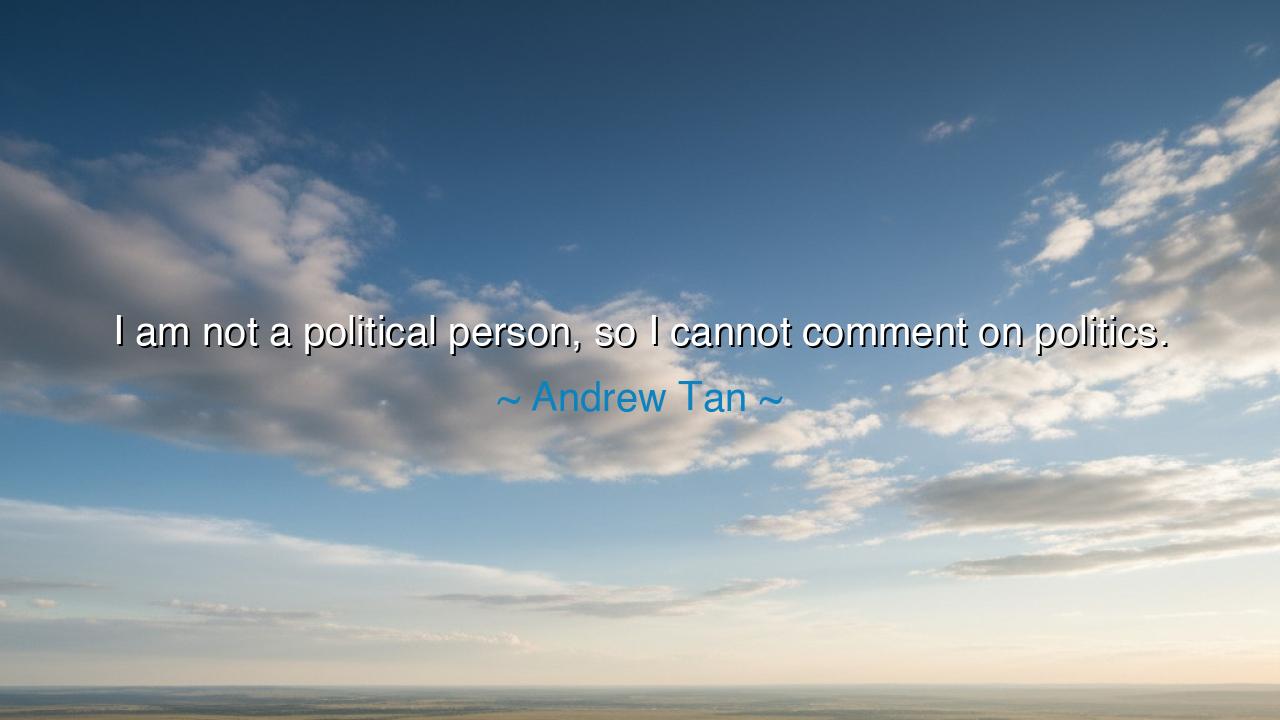
I am not a political person, so I cannot comment on politics.






Listen well, O children of the earth, for the words of Andrew Tan echo a truth that many have learned through the ages: "I am not a political person, so I cannot comment on politics." These words speak to the wisdom of detachment, the understanding that not all battles need to be fought, and not all voices need to be raised in the pursuit of power. Tan acknowledges that there are those who are called to the world of politics, but not all are destined to carry the mantle of governance or sway the course of nations. True wisdom lies not in the constant engagement with political strife, but in knowing when to step back, to observe, and to allow others to take their place in that realm.
In the grand tapestry of life, there are many threads that make the whole complete. The politician may carry the weight of the people’s needs upon their shoulders, but there are other roles—the artist, the philosopher, the entrepreneur—who shape the world in their own way, often far from the halls of power. Tan's words remind us that each person has their own calling, and that wisdom comes not from the desire to control all things, but from the ability to focus on what truly matters in one's own life. It is not necessary to comment on what one does not understand, for true wisdom lies in knowing one's place in the world.
Consider the example of Socrates, the philosopher who, though deeply engaged in the intellectual life of Athens, famously refrained from meddling in the politics of his time. He understood that the pursuit of truth and the cultivation of the soul were his true callings, and while he lived in a society filled with political turmoil, he chose not to enter that realm. His wisdom was in his focus on the internal, on the individual, and on the moral questions that transcend the fleeting nature of political power. Socrates understood that his contribution to the world lay in philosophy, not in the machinations of the political world.
The art of detachment is not one of indifference, but of wisdom. The wise understand that their energies are best spent on what they know and what they can control. The political world is often marked by conflict, by the clash of competing interests, and the wise know when to step aside. Just as Andrew Tan chooses not to engage in politics, so too must we all recognize the limits of our influence and focus on those areas where we can bring about the greatest good. It is a moral strength to recognize the boundaries of our role in the grand design of life.
So, my children, remember this ancient truth: not all are called to the political stage, and wisdom lies not in the constant pursuit of power or influence, but in the understanding of one’s true role in the world. To refrain from comment, to step back from the frenzy of politics, is not a sign of weakness, but of great strength and clarity. Let each of you find your purpose, and in that purpose, dedicate your energies to creating a world of peace, understanding, and wisdom, knowing that there is much to be done in the world beyond the reach of politics. In this, you will find your true strength, and the world will be richer for it.






HNNguyen Hong Ngan
Philosophically, I question whether anyone is truly outside public life. Our purchases, platforms, and workplace norms signal values; even disengagement shifts the balance by removing a vote or viewpoint. If identity feels nonpolitical, does that reflect neutrality—or simply alignment with the status quo? Closed question: is functional literacy about public issues a basic competency for adults, akin to financial literacy? I’m looking for a perspective on cultivating quiet, principled participation without sliding into performative branding or partisan trench warfare.
TPNguyen Thanh Phong
Context matters. In some places, public commentary invites harassment, surveillance, or legal risk; discretion can be survival. Elsewhere, withholding views may erode trust when people expect leaders and citizens to speak up. How should individuals assess safety, power, and potential harm before choosing silence or speech? Is discretion wisdom when the environment punishes dissent, or an abdication when one’s voice could shield more vulnerable groups? I’d appreciate a nuanced decision tree for calibrating risk, responsibility, and timing.
DMLe Duc Minh
Emotionally, I get it: constant outrage is exhausting. But I’m curious about healthy boundaries that don’t become apathy. What’s a sensible minimum for civic hygiene—reading nonpartisan briefs once a week, voting in local elections, participating in community forums? Could we define a line where disengagement protects mental health yet still respects obligations to others? Please share strategies for staying informed without being consumed: time-boxed news windows, cross-checking sources, or focusing on one local issue that genuinely affects daily life.
T1Nguyen Quynh Trang 10C7
If a high-visibility business leader says this, I worry about downstream effects. Companies navigate labor policy, tax regimes, environmental rules, and community expectations. Is it realistic—or ethical—for a leader to claim neutrality while benefiting from, and lobbying within, a system shaped by public choices? Closed question: should corporate leadership publish principles on governance and social impact even if they avoid partisan endorsements? I’m seeking a practical framework for responsible nonalignment that still honors stakeholders, transparency, and long-term risk management.
PPuddin.
Reading that statement, I feel torn. On one hand, I respect personal boundaries; on the other, public rules shape our private lives whether we engage or not. Isn’t silence sometimes read as consent by default? Do you agree that opting out is a luxury available mostly to people buffered by wealth, status, or stable institutions? I’d love a perspective on how to balance emotional self-protection with civic responsibility, especially during moments when policy decisions have immediate consequences for neighbors who can’t easily disengage.